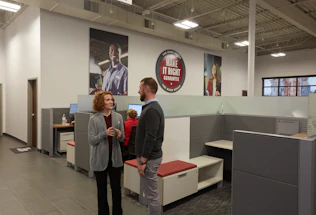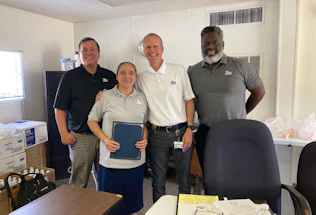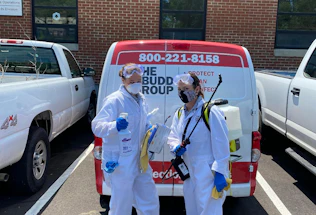Video Transcription:
Hey there, and welcome to the next installment of The Budd Group Safety Training. We’re going to be talking a little bit about how you can keep yourself safe during different types of emergencies, whether you are at work or at home. The first one that we want to talk about is weather events, which is extremely relevant right now as we are coming up on hurricane season. In our markets, the two primary weather events that we need to be concerned about are tornadoes and hurricanes. So if you are at work when one of these weather events is happening, it’s extremely important that you are familiar with the site specific emergency response plan. Your manager should have a copy of this and should be able to train you on it. This is simply going to tell you where to go in a different type of emergency or who to contact.
If you happen to be at home, it’s equally important that you have your own emergency response plan so that you know how to keep you and your family safe in a time of emergency. The primary things that we need to be concerned about when we’re dealing with these types of weather events are wind and rain. Wind can cause heavy objects to fly around and potentially strike us. And rain, as you know, can quickly cause a flash flood and cause lots and lots of trouble for us. So to avoid these things, we want to make sure that we know where we’re going to go to seek cover. We want to be able to find a place that is away from any heavy objects or away from any glass or windows. If you happen to be outside or in your vehicle, this means getting out of the vehicle and finding the lowest absolute spot that you can be, and covering your neck and your head.
And to avoid water or rising water, we’d simply want to be aware of our surroundings and know where we would go in a time of emergency, that we wouldn’t be trapped and that we can be as high as possible to avoid that water. And as a reminder one more time, it’s really, really important when you are at work that you know what you’re going to do in these types of emergencies. This means being very familiar with the emergency response plan for your site, and this also means knowing how you’re going to communicate with your manager. If you’re not at work yet, how are you going to learn about this emergency? And if you are at work, how are you going to communicate that with your manager? Whether it’s a phone call or a text message, it’s just important that you and your manager have worked this out ahead of time.
The next type of emergency that we want to cover is a fire emergency. Again, this is hopefully something that you never have to face at work. But if you do, it’s important that you know how to handle it. Here at The Budd Group, we’re going to classify fires in two ways: fires that we should fight and fires that we should not fight, fires that we need to get out immediately.
There’s a couple of ways that we can identify fires that we do not need to fight. The first is if you don’t know what is burning, then you shouldn’t try to fight it because there are different types of fires. There’s different classifications of fires, and it may be that the fire extinguisher that you have is not capable of putting out the fire that you need to put out. The second is very simple.
If it’s just too large or if it’s spreading too quickly, you need to get out and you don’t need to worry about fighting that fire. And the third would be if it’s producing some type of toxic smoke that is making people have trouble breathing, you just need to get out no matter how small the fire is and contact the authorities immediately.
If you were going to try to fight the fire with a fire extinguisher like this, it’s important that you know how to use it. The acronym that we like to use is PASS, P‑A-S‑S. And that simply means to pull the pin, to aim the hose where you want to spray it, to squeeze the trigger, and then sweep the area so that you’re not staying in one area but you’re covering the entire base of the fire that you’re trying to pull out.
Again, that’s pass, pull, aim, squeeze and sweep. But I want to remind you that as an employee of The Budd Group, it is not your responsibility to put out a fire. It is your responsibility to keep you and those around you safe. So my ultimate advice to you is to trust your gut. If it is a fire that you believe that you cannot put out, no matter how small it is, please get out and follow the evacuation plan that is a part of the emergency response plan that you have for your site. And also as soon as it’s safe to do so, contact 911 no matter how small the fire. Another type of emergency that hopefully you have to never face at work is a workplace violence incident. If this were to happen, it’s important that you know how to respond to it.
So if you were to face this type of event, and it’s important to know that this type of event does not mean just physical violence. This could be emotional violence or bullying or retribution, anything that you feel is malicious in nature. If you were to face this event, it’s important that you know how to respond to it and maybe how to even prevent it. So first, how to prevent it. Make sure that you’re paying attention to those around you and paying attention to their attitudes and personalities. And if you notice something that just doesn’t sit well with you, trust your gut and say something.
If you see something, say something, report it to your manager. Let them know that it’s making you feel uneasy, and your concern for that person that you’re working with. Oftentimes there’s other stuff going on outside of work that can cause someone to boil up, and it’s not just anything that’s happening in that one moment. So please just look out for that person and say something to your manager. If you do end up in a situation that becomes violent, the best thing that you can do is separate yourself from that situation immediately and notify a manager. If it’s a serious enough event, separate yourself from the situation and notify the authorities, or call 911 immediately.
The last type of emergency that we want to talk to you about is one that we hope that you never have to face at work, at home, or anywhere else. But it’s one that we believe at The Budd Group is extremely important for you to be prepared for, and that’s an active shooter situation. So we want to walk you through a couple of different things to help you respond in that type of emergency. As you’ve heard in other places, the way that we want to respond to this is run, hide and fight, and in that order. So the first: run. It’s extremely important that you know anywhere you are, whether an event like this is taking place or not, where your exits are, how you would get out of a building if you needed to in a hurry. Please be aware of your surroundings.
This means not always being glued to our phones, but when we walk into a new space or a new environment, making sure we know how we would get out of that environment if we needed to for any type of emergency. The second response would be to hide. And again, it’s very important that we know where we are going to hide. So you have be familiar with your surroundings and know that in that type of situation, I would go into this room and I would barricade that door with something to keep myself safe and keep those with me safe.
Now for these first two things, it’s also important to remember in this type of situation that the law enforcement that is showing up to help in this situation, they don’t know who the shooter is and who the victims are. So it’s very important if a law enforcement shows up to keep your hands visible and to identify yourself so that they know, and listen to whatever they say.
They may ask you to get on the ground or to go outside. And it’s important to just listen because again, they don’t know who the victims are or who the shooter is. The final thing would be to fight. If you do not have the opportunity to evacuate, you do not have the opportunity to hide, your best chance at survival is to engage and use anything you can around you as a weapon to fight that shooter.
The last thing we want to talk to you about is the best way to keep you safe during an active shooter event, and that’s to avoid it entirely. Most active shooter events actually do happen at the workplace, though they don’t get a lot of media coverage. Usually these types of accidents are not isolated. Usually they happen because someone has had something going on at home or something going on at work, and they’ve just had enough.
So for that reason it’s extremely important, just like when we talked about with workplace violence, for you to say something if you see something. If you’ve noticed someone’s behaviors change and it catches you off guard or you notice someone making threats or anything like that, anything that doesn’t sit well with you, please report it to your manager immediately so that we can try to help that teammate and get them the help that they need so that we can avoid situations like this.
The final thing is we often get the question, “When or how should I call 911?” And the answer is it depends. If you find yourself in this situation you want to call 911 as soon as it is safe to do so. And that simply means if you’re in an area where you shouldn’t be making noise because it may cause the shooter to find you or know where you are, then it would not be a good idea to call it that time.
Let someone else do it. But if you are in a place where you could make the call, the sooner that we can get law enforcement to that situation, the better. Again, we hope that none of these emergencies are things that any of our employees ever have to face, but we want you to be prepared to handle them.
Hey there, Budd Group managers. Thank you for taking part in this month’s safety training, and thank you for taking the safety of your employees in times of emergency, seriously. We’ve added this little clip on the end for you guys to talk a little bit about how we need to train our employees on this, as well as some of the things that you need in order to begin compliance regarding emergencies. So as referenced in the video multiple times, it’s important that each of our accounts have a site-specific emergency response plan, and that’s a very simple document.
All it does is outline what we’re going to do in different types of emergencies. The first step to coming up with this plan is to make sure that your client or your site that you’re working at and doesn’t already have one that they want you to abide by. They may have a set of standards that they expect you to have written down and teach your employees as well. But whether they do or whether they don’t, we want to make sure that we adopt our own site-specific plan, and including theirs if we need to, or not if they ask us not to.
The Budd Group strives to be a God-honoring company of excellence safely delivering services in janitorial, maintenance, and landscaping; offering development opportunities for their employees; and contributing to their community.
Interested in working for The Budd Group? We are hiring and offer benefits!
Find a Job
We have locations in Florida, Georgia, Kentucky, Mississippi, North Carolina, South Carolina, Tennessee, Virginia, and West Virginia.
Please use the links above for applying to The Budd Group for any position throughout our company. However, if you need to contact someone regarding a specific question, please use the phone number or email for the office nearest you from the list below.








